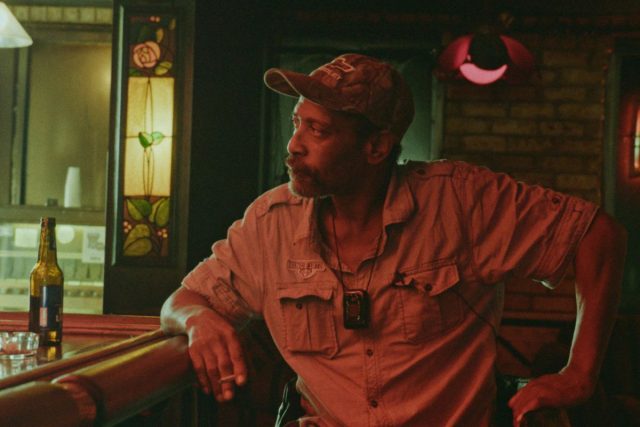Bloody Nose, Empty Pockets: You Can’t Stay Here, by David Bax

When brothers Turner Ross and Bill Ross IV made their enthralling new documentary/drama hybrid Bloody Nose, Empty Pockets–charting the final day in business of a Las Vegas dive bar far from the Strip–they were certainly aiming for something bittersweet. They could not have predicted, though, how longingly painful it would be to watch the film in the unique summer of 2020. What I wouldn’t give to spend an afternoon or longer hiding from the sweltering July sun in a dark bar, half-enjoying the generic playlist shuffle of the jukebox and talking about or just listening to nothing and everything. Bloody Nose, Empty Pockets is all the more stunning an achievement for its awareness that it’s no substitute for the real thing.
Speaking of the real thing, there’s some argument as to whether or not that’s what Bloody Nose, Empty Pockets really is. The Roaring 20’s Cocktail Lounge did not actually go out of business. In fact, it’s not even in Las Vegas (it’s in the Algiers neighborhood in New Orleans’ West Bank). The Ross brothers invented the location and premise and then “cast” their company of drinkers. After that, though, they turned on the cameras and mostly let things happen as they may. Some embrace the ruse, like the bartender who says of Las Vegas, “Fuckin’ Celine Dion can have it, I’m moving.” Others seems to just go about the business of imbibing and pontificating as they might have done anyway.
One of the takeaways of Bloody Nose, Empty Pockets is that, when it comes to places like Roaring 20’s, it probably doesn’t matter much which city it’s in. The philosophers and their laments and punditry are more or less the same no matter what barstools they’re occupying.
Don’t prepare yourself for some real life version of Cheers, though. Many of the participants appear to be actual alcoholics (at least one of them admittedly so), with the advancing age and dwindling prospects that archetype suggests, making some stretches of nonsensical conversation as depressing as they are funny.
More than once, such exchanges turn into confrontations, with the aggressor equally as likely to be ejected by the staff as to be friends with his enemy again in a matter of seconds. It’s this cycle of wounds and their forgiveness, along with the natural camaraderie of spending hours together, that leads the drunks of Bloody Nose, Empty Pockets to occasionally remark that they are like family to one another, a sentiment that is no less meaningful to them just because it’s a cliché.
But Roaring 20’s is closing (at least in this imagined reality) and perhaps these men and women will find separate watering holes and never see each other again. Bloody Nose, Empty Pockets‘ stylized credits evoke the 1970s, suggesting a timelessness to the film’s milieu. But that’s not actually the case. To people living in forfeiture to alcoholism, things aren’t forever; they’re already over. Bars close, casinos get torn down and drinking with people doesn’t make them your family. That doesn’t mean that sharing some time with them before everything ends didn’t mean something.






























